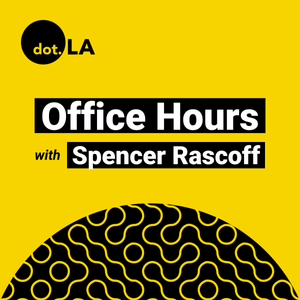
The Invisible Influence of Language — with Lera Boroditsky
02/24/22 • 40 min
3 Listeners
One of the oldest technologies we have is language. How do the words we use influence the way we think?
The media can talk about immigrants scurrying across the border, versus immigrants crossing the border. Or we might hear about technology platforms censoring us, versus moderating content.
If those word choices shift public opinion on immigration or technology by 25%, or even 2%, then we’ve been influenced in ways we can't even see. Which means that becoming aware of how words shape the way we think can help inoculate us from their undue influence. And further, consciously choosing or even designing the words we use can help us think in more complex ways – and address our most complex challenges.
This week on Your Undivided Attention, we're grateful to have Lera Boroditsky, a cognitive scientist who studies how language shapes thought. Lera is an Associate Professor of Cognitive Science at UC San Diego, and the editor-in-chief of Frontiers in Cultural Psychology.
Clarification: in the episode, Aza refers to Elizabeth Loftus' research on eyewitness testimony. He describes an experiment in which a car hit a stop sign, but the experiment actually used an example of two cars hitting each other.
RECOMMENDED MEDIA
How language shapes the way we think
Lera Boroditsky's 2018 TED talk about how the 7,000 languages spoken around the world shape the way we think
Measuring Effects of Metaphor in a Dynamic Opinion Landscape
Boroditsky and Paul H. Thibodeau's 2015 study about how the metaphors we use to talk about crime influence our opinions on how to address crime
Subtle linguistic cues influence perceived blame and financial liability
Boroditsky and Caitlin M. Fausey's 2010 study about how the language used to describe the 2004 Super Bowl "wardrobe malfunction" influence our views on culpability
Why are politicians getting 'schooled' and 'destroyed'?
BBC article featuring the research of former Your Undivided Attention guest Guillaume Chaslot, which shows the verbs YouTube is most likely to include in titles of recommended videos — such as "obliterates" and "destroys"
RECOMMENDED YUA EPISODES
Mind the (Perception) Gap: https://www.humanetech.com/podcast/33-mind-the-perception-gap
Can Your Reality Turn on a Word?: https://www.humanetech.com/podcast/34-can-your-reality-turn-on-a-word
Down the Rabbit Hole by Design: https://www.humanetech.com/podcast/4-down-the-rabbit-hole-by-design
One of the oldest technologies we have is language. How do the words we use influence the way we think?
The media can talk about immigrants scurrying across the border, versus immigrants crossing the border. Or we might hear about technology platforms censoring us, versus moderating content.
If those word choices shift public opinion on immigration or technology by 25%, or even 2%, then we’ve been influenced in ways we can't even see. Which means that becoming aware of how words shape the way we think can help inoculate us from their undue influence. And further, consciously choosing or even designing the words we use can help us think in more complex ways – and address our most complex challenges.
This week on Your Undivided Attention, we're grateful to have Lera Boroditsky, a cognitive scientist who studies how language shapes thought. Lera is an Associate Professor of Cognitive Science at UC San Diego, and the editor-in-chief of Frontiers in Cultural Psychology.
Clarification: in the episode, Aza refers to Elizabeth Loftus' research on eyewitness testimony. He describes an experiment in which a car hit a stop sign, but the experiment actually used an example of two cars hitting each other.
RECOMMENDED MEDIA
How language shapes the way we think
Lera Boroditsky's 2018 TED talk about how the 7,000 languages spoken around the world shape the way we think
Measuring Effects of Metaphor in a Dynamic Opinion Landscape
Boroditsky and Paul H. Thibodeau's 2015 study about how the metaphors we use to talk about crime influence our opinions on how to address crime
Subtle linguistic cues influence perceived blame and financial liability
Boroditsky and Caitlin M. Fausey's 2010 study about how the language used to describe the 2004 Super Bowl "wardrobe malfunction" influence our views on culpability
Why are politicians getting 'schooled' and 'destroyed'?
BBC article featuring the research of former Your Undivided Attention guest Guillaume Chaslot, which shows the verbs YouTube is most likely to include in titles of recommended videos — such as "obliterates" and "destroys"
RECOMMENDED YUA EPISODES
Mind the (Perception) Gap: https://www.humanetech.com/podcast/33-mind-the-perception-gap
Can Your Reality Turn on a Word?: https://www.humanetech.com/podcast/34-can-your-reality-turn-on-a-word
Down the Rabbit Hole by Design: https://www.humanetech.com/podcast/4-down-the-rabbit-hole-by-design
Previous Episode

How Science Fiction Can Shape Our Reality — with Kim Stanley Robinson
The meta-crisis is so vast: climate change, exponential technology, addiction, polarization, and more. How do we grasp it, let alone take steps to address it?
One of the thinking tools we have at our disposal is science fiction. To the extent that we co-evolve with our stories, science fiction can prepare us for the impending future — and empower us to shape it.
This week on Your Undivided Attention, we're thrilled to have one of the greatest living science-fiction writers — Kim Stanley Robinson. His most recent novel is The Ministry for the Future, a sweeping epic that reaches into the very near future, and imagines what it would take to unite humanity and avoid a mass extinction. Whether or not you've read the book, this episode has insights for you. And if this episode makes you want to read the book, our conversation won't spoil it for you.
Clarification: in the episode, Robinson refers to philosopher Antonio Gramsci's "pessimism of the intellect, optimism of the will." This phrase was originally said by novelist and playwright Romain Rolland. Gramsci made the phrase the motto of his newspaper, because he appreciated its integration of radical intellectualism with revolutionary activism.
RECOMMENDED MEDIA
The Ministry For The Future
Robinson's latest novel and the subject of our conversation — which reaches into the near future, and imagines what it would take to unite humanity and avoid a mass extinction
A Deeper Dive Into the Meta Crisis
CHT's blog post about the meta-crisis, which includes the fall of sense-making and the rise of decentralized technology-enabled power
The project based on E. O. Wilson's proposal to conserve half the land and sea — in order to safeguard the bulk of biodiversity, including ourselves
Global tech worker community mobilizing the technology industry to face the climate crisis
RECOMMENDED YUA EPISODES
18 – The Stubborn Optimist’s Guide to Saving the Planet: https://www.humanetech.com/podcast/18-the-stubborn-optimists-guide-to-saving-the-planet
Bonus – The Stubborn Optimist’s Guide Revisited: https://www.humanetech.com/podcast/bonus-the-stubborn-optimists-guide-revisited
29 – A Renegade Solution to Extractive Economics: https://www.humanetech.com/podcast/29-a-renegade-solution-to-extractive-economics
Your Undivided Attention is produced by the Center for Humane Technology. Follow us on Twitter: @HumaneTech_
Next Episode

The Dark Side Of Decentralization — with Audrey Kurth Cronin
Is decentralization inherently a good thing?
These days, there's a lot of talk about decentralization. Decentralized social media platforms can allow us to own our own data. Decentralized cryptocurrencies can enable bank-free financial transactions. Decentralized 3D printing can allow us to fabricate anything we want.
But if the world lives on Bitcoin, we may not be able to sanction nation states like Russia when they invade sovereign nations. If 3D printing is decentralized, anyone can print their own weapons at home. Decentralization takes on new meaning when we're talking about decentralizing the capacity for catastrophic destruction.
This week on Your Undivided Attention, we explore the history of decentralized weaponry, how social media is effectively a new decentralized weapon, and how to wisely navigate these threats. Guiding us through this exploration is Audrey Kurth Cronin — one of the world’s leading experts in security and terrorism. Audrey is a distinguished Professor of International Security at American University, and the author of several books — most recently: Power to the People: How Open Technological Innovation is Arming Tomorrow’s Terrorists.
Clarification: in the episode, Tristan refers to a video of Daniel Schmachtenberger's as "The Psychological Pitfalls of Working on Existential Risk." The correct name of the video is "Psychological Pitfalls of Engaging With X-Risks & Civilization Redesign."
RECOMMENDED MEDIA
Power to the People: How Open Technological Innovation is Arming Tomorrow's Terrorists
Audrey Kurth Cronin's latest book, which analyzes emerging technologies and devises a new framework for analyzing 21st century military innovation
Psychological Pitfalls of Engaging With X-Risks & Civilization Redesign
Daniel Schmachtenberger's talk discussing the psychological pitfalls of working on existential risks and civilization redesign
Policy Reforms Toolkit
The Center for Humane Technology's toolkit for developing policies to protect the conditions that democracy needs to thrive: a comprehensively educated public, a citizenry that can check the power of market forces and bind predatory behavior
RECOMMENDED YUA EPISODES
22 – Digital Democracy is Within Reach with Audrey Tang: https://www.humanetech.com/podcast/23-digital-democracy-is-within-reach
28 – Two Million Years in Two Hours: A Conversation with Yuval Noah Harari: https://www.humanetech.com/podcast/28-two-million-years-in-two-hours-a-conversation-with-yuval-noah-harari
45 – Is World War III Already Here? Guest: Lieutenant General H.R. McMaster: https://www.humanetech.com/podcast/45-is-world-war-iii-already-here
If you like this episode you’ll love
Episode Comments
Featured in these lists
Generate a badge
Get a badge for your website that links back to this episode
<a href="https://goodpods.com/podcasts/your-undivided-attention-22649/the-invisible-influence-of-language-with-lera-boroditsky-19663273"> <img src="https://storage.googleapis.com/goodpods-images-bucket/badges/generic-badge-1.svg" alt="listen to the invisible influence of language — with lera boroditsky on goodpods" style="width: 225px" /> </a>
Copy




